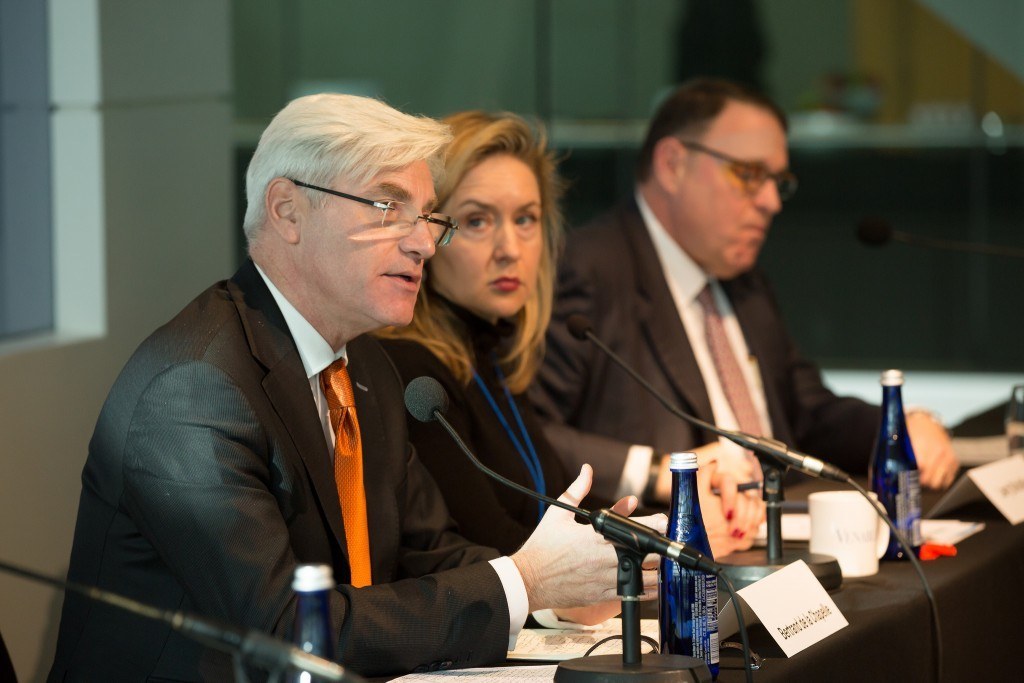25
Jan 2016
I&J Director Speaks at the 2016 State of the Net Conference
I&J contributed
December 17, 2015
Multistakeholder Cooperation is Required
The State of the Net conference, held in Washington DC on January 25, 2016, is organized each year by the Internet Education Foundation. It brings together US leaders in the field of Internet Governance. Topics of the 12th edition of the conference ranged from user data collection and the EU-US Safe Harbor Agreement, to Net Neutrality and the IANA transition.
Bertrand de La Chapelle, Shane Tews, and Larry Strickling in the session, “International perspectives of the state of governance on the Internet.”
Bertrand de La Chapelle, Director of Internet & Jurisdiction, was invited to discuss the “International perspectives of the state of governance on the Internet” alongside Larry Strickling, Assistant Secretary for Communications and Information at the US Department of Commerce.
How do we apply sovereignty on the Internet? How do we apply national laws on the cross-border Internet?
Regarding the jurisdiction challenge, traditional tools of international legal cooperation struggle to cope with the digital realities of the 21st century. Mutual Legal Assistance Treaties (MLATs) were designed to ensure a certain level of legal interoperability. However, this “switch-network of international cooperation” has clear limitations in terms of scope and scalability.
What happens in the absence of an environment that enables multi-stakeholder cooperation and much needed solutions and standards? The adoption of unilateral solutions by states can lead to “a legal arms race.” The global community faces a prisoner’s dilemma. The lack of coordination and dialogue across borders and stakeholder groups can make the problem ultimately harder to solve.
Filling the Institutional Gap
A performing governance ecosystem for the Governance “of” the Internet (ICANN, IETF, W3C, RIRs etc.) emerged over the past two decades. The ecosystem for the Governance “on” the Internet (the uses and abuses of the Internet and its services), is yet only nascent. Bertrand de la Chapelle stressed that the main global challenge for the Governance “on” the Internet is:
developing transnational cooperation mechanisms that are as distributed and as participatory as the Internet itself.
Addressing the jurisdiction challenge requires ongoing multi-stakeholder dialogue in order to build trust and catalyze much needed operational solutions. The global community requires shared regimes and shared solutions that are based upon procedural interoperability and that ensure due process across borders.

Bertrand de La Chapelle, Shane Tews, and Larry Strickling at the State of the Net Conference. CC BY-NC-SA 2.0 Internet Education Foundation.
Multistakeholder Cooperation is Required
The State of the Net conference, held in Washington DC on January 25, 2016, is organized each year by the Internet Education Foundation. It brings together US leaders in the field of Internet Governance. Topics of the 12th edition of the conference ranged from user data collection and the EU-US Safe Harbor Agreement, to Net Neutrality and the IANA transition.
Bertrand de La Chapelle, Shane Tews, and Larry Strickling in the session, “International perspectives of the state of governance on the Internet.”
Bertrand de La Chapelle, Director of Internet & Jurisdiction, was invited to discuss the “International perspectives of the state of governance on the Internet” alongside Larry Strickling, Assistant Secretary for Communications and Information at the US Department of Commerce.
How do we apply sovereignty on the Internet? How do we apply national laws on the cross-border Internet?
Regarding the jurisdiction challenge, traditional tools of international legal cooperation struggle to cope with the digital realities of the 21st century. Mutual Legal Assistance Treaties (MLATs) were designed to ensure a certain level of legal interoperability. However, this “switch-network of international cooperation” has clear limitations in terms of scope and scalability.
What happens in the absence of an environment that enables multi-stakeholder cooperation and much needed solutions and standards? The adoption of unilateral solutions by states can lead to “a legal arms race.” The global community faces a prisoner’s dilemma. The lack of coordination and dialogue across borders and stakeholder groups can make the problem ultimately harder to solve.
Filling the Institutional Gap
A performing governance ecosystem for the Governance “of” the Internet (ICANN, IETF, W3C, RIRs etc.) emerged over the past two decades. The ecosystem for the Governance “on” the Internet (the uses and abuses of the Internet and its services), is yet only nascent. Bertrand de la Chapelle stressed that the main global challenge for the Governance “on” the Internet is:
developing transnational cooperation mechanisms that are as distributed and as participatory as the Internet itself.
Addressing the jurisdiction challenge requires ongoing multi-stakeholder dialogue in order to build trust and catalyze much needed operational solutions. The global community requires shared regimes and shared solutions that are based upon procedural interoperability and that ensure due process across borders.

Bertrand de La Chapelle, Shane Tews, and Larry Strickling at the State of the Net Conference. CC BY-NC-SA 2.0 Internet Education Foundation.



